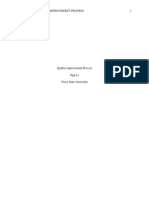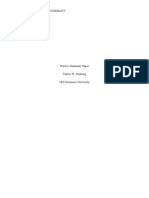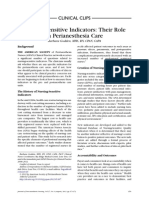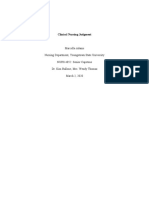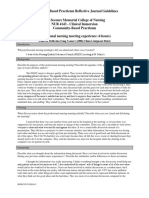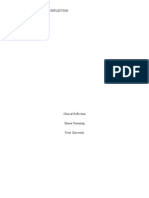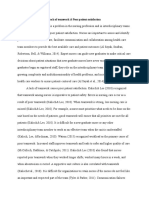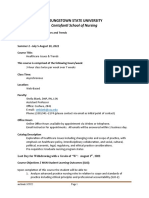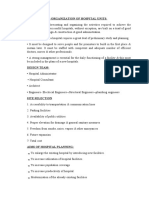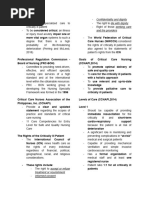Nurse Manager Interview and Analysis
Nurse Manager Interview and Analysis
Uploaded by
api-284683257Copyright:
Available Formats
Nurse Manager Interview and Analysis
Nurse Manager Interview and Analysis
Uploaded by
api-284683257Original Title
Copyright
Available Formats
Share this document
Did you find this document useful?
Is this content inappropriate?
Copyright:
Available Formats
Nurse Manager Interview and Analysis
Nurse Manager Interview and Analysis
Uploaded by
api-284683257Copyright:
Available Formats
Running head: NURSE MANAGER
Nurse Manager Interview and Analysis
April Greene, Katherine Helms, and Andrea Vanportfliet
Ferris State University
NURSE MANAGER
Nurse Manager Interview and Analysis
JW is the Nurse Manager of the Adult Critical Care at Spectrum Health, Blodgett
Hospital. She has been in this position for 11 years now. She received her Bachelor's degree
from Calvin College. Before acquiring this role, she worked as an RN on a medical/surgical unit
before landing a job in critical care. She worked there for 7 years when she was approached and
offered a manager position. She worked part time for a year and a half before taking over full
time (Wilks, 2016).
JW enjoys the financial side of her job. She pushes to work smarter and be financially
fiscal, (Wilks, 2016). She enjoys creating committees to make a difference and likes the
teamwork aspect of her job. She also finds it rewarding to speak for those who do not have a
voice. JW describes the hardest part of her job as dealing with healthcare costs and how to give
proper care to all patients with what they are given. Another challenge is keeping nurses. The
newer nurses on the floor do not stay for long, and staff is not consistent. The purpose of this
paper is to explore and analyze the role and requirements that it takes in order to be a successful
nurse manager.
Job Description and Duties
As the manager of a nursing unit, JW acts as a role model to the staff. She creates
committees and promotes teamwork among all staff members. JW describes herself as a
visionary; she likes to set goals for her team, get them engaged, create autonomy, and allows
them to make mistakes in order to facilitate learning. If the floor is busy and/or understaffed, she
assists with patient care tasks. A big portion of her position is responsible for financial planning
and budgeting for everything. She must determine staff scheduling and nurse to nurse technician
ratio. JW has 65 staff members that work beneath her. All staff reports to both the night
NURSE MANAGER
supervisor and the nurse manager. They are encouraged to talk to both if an issue arises. JW
then reports to the director of all critical care units at both Butterworth and Blodgett. The
director then reports to the Vice President of nursing at Spectrum (Wilks, 2016).
Communication and Influence
Effective communication on a nursing unit is defined as oral and written material for a
diverse audience, facilitating group discussions, and demonstrating strong communication skills
(American Organization of Nurse Executives, 2011). JW believes that communication is key in
running a successful nursing unit. She uses multiple methods, which include email, flyers, faceto-face discussion, and staff meetings. Consistent communication and repetition, JW believes, is
necessary for quality care. Empathy, as well as an authoritative leadership style, is needed for
effective communication. JW has an open door policy and encourages all staff to have a
relationship with her. She knows her staff well and she promotes relationship building among
them. Every new staff member that joins her team is encouraged to make a small biography so
that all other staff can learn about them. There is also a social committee on the floor and special
events are celebrated among them. Conflict among staff members is rare, but JW facilitates
minor conflict management if necessary (Wilks, 2016).
Leadership
JW described herself as being a transformational leader which Yoder-Wise defines
as based on an inspiring vision that changes the framework of the organization for employees
(Yoder-Wise, 2014, p.42). JW uses this leadership style in handling various issues on the units
with patients, staff, leadership and ethics. In dealing with issues with the patient, she says that
she actively listens, says Im sorry often, and does what she personally can to help deescalate
the situation. In dealing with staff and leadership issues, she uses the term manage-up meaning
NURSE MANAGER
step up and do what you can to help and always lead by example (Wilks, 2016). JW also makes
sure to always be careful of what she says and whom she says it to. She says when dealing with
ethics, she always refers and obtains help from the ethics committee at the hospital as they are
experts in dealing with these types of situations.
Quality Improvement and Risk Management
Quality improvement is defined as an ongoing process of innovation, prevention of error,
and staff development that is used by institutions that adopt the quality management philosophy
(Yoder-Wise, 2014, p. 390). JW described that in order to drive quality improvement on her
critical care unit everything revolved around what was best for the patient, have patients be able
to move to a step down unit from the ICU, and to push her staff to be the best that they can be
(Wilks, 2016). To facilitate these goals she pushes her staff to be competitive, join committees
such as the quality committee, and holds her staff to the highest of expectations. JW also create a
board in the staff conference room that points of quality improvement techniques and what the
staff can do in order to reach the unit goals.
The purpose of risk management is to achieve quality outcome standards, and prevent
and patient-care problems (Yoder-Wise, 2014, p. 403). JW has already shown that she has
reached this goal in a number of ways, and is always searching to find new ways in which she
can decrease errors in order to provide higher a higher patient-care standard. JW described that
one way in which she has achieved this goal is by decreasing the use of restraints in the critical
care until from a total of 50% down to only 10-20% of patients needing the use of restraints. She
accomplished this by researching and using various hospital resources to find that the use of
restraints is not always necessary for patient care in the critical care setting. Just recently JW has
been given permission to carry out a trial plan to remove the answering of phone calls while at
NURSE MANAGER
the bedside. She describes this action as being a distraction to direct patient care that could
potentially increase the rate of errors, (Wilks, 2016). In doing so she found that there are
alternatives ways in which the staff can receive important messages, such as texting the staff
from their work phones so they can read them after leaving the bedside. JW said that if the
message was that urgent they would find a different communication method to get the message
where it needed to be, (Wilks, 2016). In conclusion, the reasons that JW is implementing these
changes is to decrease staff error and increase the quality of care the patient is receiving.
Professionalism
Professionalism is how you present yourself to others through attitude, appearance,
willingness to help others, and can also include knowledge and skills (Bunkenborg, Samuelson,
Akeson, & Poulson, 2013). JW expects the nurses on her floor to act in a professional manner in
every situation, whether they are with a patient or not. She described professionalism as the way
one presents themselves, their attitude towards a given situation, and whether they continue to
seek knowledge in their profession. (Wilks, 2016). JW also believes that accountability and
advocacy are very important to the nursing profession. She promotes accountability and
advocacy on her floor by allowing her staff to come to her with any mistakes or concerns so the
best care can be provided for the patient. Advocacy includes the nurse speaking up on behalf of
the patient in situations when safety issues arise, (Battie & Steelman, 2014). By having an open
door policy and promoting her staff to feel comfortable coming to her with any issues, she is
creating a safer environment for not only the patients, but for the staff as well.
Business Skills
Developing and managing an annual operating budget and long-term plan and managing
financial resources are very important skills for a nurse manager to have (American Organization
NURSE MANAGER
of Nurse Executives, 2011). JW discussed some ways she is able to budget her finances for the
year, which must involve budgeting for any equipment needed, hours per patient day, RN and
nurse technician ratio, and payroll. She typically sets a budget by looking back to the prior year
and using that for the next year, which can change very quickly (Wilks, 2016). Staff management
is also very important, which can involve staff ratios, staff satisfaction and quality of work, and
staff retention strategies. By ensuring the floor is adequately staffed and has high satisfaction
ratings, it is more likely they will continue to work on the floor, which will lead to better a team.
Conclusion
In conclusion, to be a successful nurse manager it is important to incorporate
professionalism, effective communication, leadership and business skills, and tools to implement
quality improvement and risk management. JW is successful in her role as a nurse leader because
she integrates these characteristics into her daily routine. Upon completion of this interview, we
have gained insight on what it means to be a leader in the nursing field. We can use this
knowledge as we move forward in our nursing career to demonstrate exceptional leadership
skills.
NURSE MANAGER
References
American Organization of Nurse Executives. (2011). The AONE Nurse Executive Competencies.
Retrieved from https://fsulearn.ferris.edu/bbcwebdav/pid-805459-dt-content-rid5081718_1/courses/11124.201510/AONE_NEC%281%29.pdf
Battie, Renae, and Victoria Steelman. "Accountability in Nursing Practice: Why It Is Important
for Patient Safety." AORN Journal 100.5 (2014): 537-41.
Bunkenborg G., Samuelson K., Akeson J. & Poulsen I. (2013) Impact of professionalism in
nursing on in-hospital bedside monitoring practice. Journal of Advanced Nursing 69(7),
14661477. doi: 10.1111/jan.12003
Wilks, Janet. Personal interview by April Greene, Katherine Helms, & Andrea VanPortfliet, 22
Mar. 2016.
Yoder-Wise, P. S. (2015). Leading and managing in nursing (6 ed.). St. Louis, MO: Saunders.
th
You might also like
- Neonatal Intensive Care Unit (Nicu)Document30 pagesNeonatal Intensive Care Unit (Nicu)Uday Kumar100% (18)
- Do You Agree or Disagree With McCarthyDocument3 pagesDo You Agree or Disagree With McCarthyBinu Kumar100% (4)
- Proofed - Nurs 4021 Final EvaluationDocument19 pagesProofed - Nurs 4021 Final Evaluationapi-313199824No ratings yet
- Nursing Leadership Analysis PaperDocument9 pagesNursing Leadership Analysis Paperapi-240099055100% (3)
- Introduction For Nurse Leader InterviewDocument4 pagesIntroduction For Nurse Leader Interviewapi-312833369No ratings yet
- Nur 460 Capstone Final PaperDocument15 pagesNur 460 Capstone Final Paperapi-429837528No ratings yet
- Nurs 440, Quality Improvement Process Paper, Fall 2014Document8 pagesNurs 440, Quality Improvement Process Paper, Fall 2014api-253664398No ratings yet
- Clinical Practicum PaperDocument26 pagesClinical Practicum Paperncory79100% (1)
- Nurs403 Practice Summary Paper NeuburgDocument14 pagesNurs403 Practice Summary Paper Neuburgapi-452041818No ratings yet
- Sharanjitsa1 3195640 Nurs324 Assignment 2 Dropbox Philosophy of Nursing Scholarly Paper Assignment 2-3Document11 pagesSharanjitsa1 3195640 Nurs324 Assignment 2 Dropbox Philosophy of Nursing Scholarly Paper Assignment 2-3api-29178843567% (3)
- Nse 417 Midterm Evaluation Rosette LenonDocument7 pagesNse 417 Midterm Evaluation Rosette Lenonapi-341527743No ratings yet
- Nurse Manager Analysis PaperDocument7 pagesNurse Manager Analysis Paperapi-259018499No ratings yet
- Analyzing The Leadership Role of A Nurse ManagerDocument7 pagesAnalyzing The Leadership Role of A Nurse Managerapi-253808965100% (1)
- Manager Interview PaperDocument8 pagesManager Interview Paperapi-301802746100% (2)
- Nur 490 Nurse Leader InterviewDocument6 pagesNur 490 Nurse Leader Interviewapi-369824515No ratings yet
- Nursing Supervisor InterviewDocument8 pagesNursing Supervisor Interviewapi-234767222No ratings yet
- Nurising Assignment ConflictDocument10 pagesNurising Assignment ConflictLauren KalantaNo ratings yet
- Nurse Commitment: How to Retain Professional Staff Nurses in a Multigenerational WorkplaceFrom EverandNurse Commitment: How to Retain Professional Staff Nurses in a Multigenerational WorkplaceNo ratings yet
- The Patient's Primary Care Experience: A Road Map to Powerful PartnershipsFrom EverandThe Patient's Primary Care Experience: A Road Map to Powerful PartnershipsNo ratings yet
- Communication, Collaboration, and You: Tools, Tips, and Techniques for Nursing PracticeFrom EverandCommunication, Collaboration, and You: Tools, Tips, and Techniques for Nursing PracticeRating: 4 out of 5 stars4/5 (1)
- The Nurse Manager Accelerator Transition from Bedside Nursing to Nurse Manager in 6 stepsFrom EverandThe Nurse Manager Accelerator Transition from Bedside Nursing to Nurse Manager in 6 stepsNo ratings yet
- QA-200406172506 Nursing Leadership Interview Report - EditedDocument6 pagesQA-200406172506 Nursing Leadership Interview Report - EditedFrancisNo ratings yet
- Nursing Leadership PhilosophyDocument8 pagesNursing Leadership Philosophyapi-449184986No ratings yet
- Clinical Decision MakingDocument8 pagesClinical Decision Makingapi-400245000100% (1)
- N 657 - Advanced Physical Assessment Clinical Decision MakingDocument17 pagesN 657 - Advanced Physical Assessment Clinical Decision Makingapi-267840127No ratings yet
- Nursing Sensitive Indicators Their RoleDocument3 pagesNursing Sensitive Indicators Their RolePuspita Eka Kurnia SariNo ratings yet
- Analysis On Policy HR 2581 - Selina DykesDocument8 pagesAnalysis On Policy HR 2581 - Selina Dykesapi-520664738No ratings yet
- Clinical Nursing JudgmentDocument5 pagesClinical Nursing Judgmentapi-508051902No ratings yet
- U04a1 - Patient Fall Reduction Executive SummaryDocument11 pagesU04a1 - Patient Fall Reduction Executive SummaryTawana CherryNo ratings yet
- Final Reflection DkropaczekDocument3 pagesFinal Reflection Dkropaczekapi-294937204No ratings yet
- Wharton - Professional Meeting ReflectionDocument3 pagesWharton - Professional Meeting Reflectionapi-456719996No ratings yet
- Professional Meeting Reflection - GracDocument3 pagesProfessional Meeting Reflection - Gracapi-540011183No ratings yet
- Insights Gained Through Interviewing Chief Nurse ExecutiveDocument4 pagesInsights Gained Through Interviewing Chief Nurse Executivecljjch75769901No ratings yet
- Nurse Leader InterviewDocument3 pagesNurse Leader Interviewapi-309907196100% (1)
- Clinical ReflectionDocument7 pagesClinical Reflectionapi-241120000No ratings yet
- Reflection About Palliative Care and End of Life CareDocument5 pagesReflection About Palliative Care and End of Life CareVILLEJO JHOVIALENNo ratings yet
- Lack of Teamwork Poor Patient Saticfaction - Paper 1Document6 pagesLack of Teamwork Poor Patient Saticfaction - Paper 1api-314968337No ratings yet
- Analysis of Nurse Manager InterviewDocument8 pagesAnalysis of Nurse Manager InterviewtaniaNo ratings yet
- RN Self Assessment ExamplesDocument10 pagesRN Self Assessment ExamplesAmbika SuwalNo ratings yet
- Philosophy of Nursing 2014Document4 pagesPhilosophy of Nursing 2014ejc52100% (2)
- Horizontal ViolenceDocument6 pagesHorizontal Violenceapi-312055738No ratings yet
- hsns206 Ethical and Legal ResponsibilityDocument4 pageshsns206 Ethical and Legal Responsibilityapi-479186899No ratings yet
- Program Graduate Competency ReflectionsDocument19 pagesProgram Graduate Competency Reflectionsapi-458040024No ratings yet
- Ten Nursing TheoryDocument13 pagesTen Nursing TheoryleiNo ratings yet
- Nurse Leader Nurs 440Document8 pagesNurse Leader Nurs 440api-273238350No ratings yet
- Clinical Nursing JudgementDocument6 pagesClinical Nursing Judgementapi-508132058No ratings yet
- Nursing CompetenciesDocument22 pagesNursing CompetenciesBishwajitMazumderNo ratings yet
- 1 Running Head: Program Graduate Competencies Reflection PaperDocument9 pages1 Running Head: Program Graduate Competencies Reflection Paperapi-458055311No ratings yet
- AHRQ Prevention Quality IndicatorsDocument1 pageAHRQ Prevention Quality IndicatorsJPNo ratings yet
- Nursing and Midwifery Board - Questionnaire - Re Entry To Practice Self Assessment Questionnaire - Enrolled NurseDocument10 pagesNursing and Midwifery Board - Questionnaire - Re Entry To Practice Self Assessment Questionnaire - Enrolled NurseZafarsodikNo ratings yet
- High Patient Nurse RatiosDocument2 pagesHigh Patient Nurse Ratiosrachel lorenNo ratings yet
- Critical IncidentDocument11 pagesCritical Incidentrumba2009No ratings yet
- Clinical Nurse Leader Portfolio 1Document7 pagesClinical Nurse Leader Portfolio 1api-247952145No ratings yet
- QsenDocument16 pagesQsenapi-239630424100% (1)
- Chief Nursing Officer InterviewDocument7 pagesChief Nursing Officer Interviewapi-237845240No ratings yet
- Teaching PlanDocument9 pagesTeaching PlanPreet ChahalNo ratings yet
- Nursing Philosophy Week 6Document8 pagesNursing Philosophy Week 6api-449137790No ratings yet
- Nurs 6900 Syllabus Summer 22 1Document8 pagesNurs 6900 Syllabus Summer 22 1api-635690065No ratings yet
- NURS 322 - Assign 3 WebsiteDocument8 pagesNURS 322 - Assign 3 WebsiteYvette FonkweNo ratings yet
- Running Head: Graduate Program Competency: Reflection Paper 1Document11 pagesRunning Head: Graduate Program Competency: Reflection Paper 1api-355924702No ratings yet
- Running Head: Program Graduate Competencies 1Document12 pagesRunning Head: Program Graduate Competencies 1api-509672908No ratings yet
- Versoza, Ryan Benlix P - Reading AssignmentDocument6 pagesVersoza, Ryan Benlix P - Reading AssignmentDarvey LongaraNo ratings yet
- pediatric crtical care intro PART 1Document122 pagespediatric crtical care intro PART 1kabulkabulovich5No ratings yet
- ICU-Acquired Weakness and Recovery From Critical IllnessDocument9 pagesICU-Acquired Weakness and Recovery From Critical IllnessFebrian ParuraNo ratings yet
- Planning and Organizing of HospitalDocument36 pagesPlanning and Organizing of HospitalMamta Poonia100% (1)
- Thesis ShereeDocument78 pagesThesis ShereeSheree Nichole GuillerganNo ratings yet
- COVID-19 and Healthcare Facilities: A Decalogue of Design Strategies For Resilient HospitalsDocument12 pagesCOVID-19 and Healthcare Facilities: A Decalogue of Design Strategies For Resilient HospitalsNadeem AhmadNo ratings yet
- Persistent Critical Illness & Nutrition Considerations - JPEN 2024 (Viner)Document9 pagesPersistent Critical Illness & Nutrition Considerations - JPEN 2024 (Viner)Daniela QuirogaNo ratings yet
- Recommended Standards For Newborn ICU DesignDocument39 pagesRecommended Standards For Newborn ICU DesignAlbert SekarNo ratings yet
- FLOWCHARTSDocument19 pagesFLOWCHARTSVarda Sami100% (1)
- Amores Reviewer Ko GawaDocument12 pagesAmores Reviewer Ko GawaBryant Von Andrew EstradaNo ratings yet
- Legal Nurse Consultant Paralegal in Dallas FT Worth TX Resume Sherri StewartDocument3 pagesLegal Nurse Consultant Paralegal in Dallas FT Worth TX Resume Sherri StewartSherriStewart2No ratings yet
- Alarm ManagementDocument2 pagesAlarm ManagementAnisaNo ratings yet
- Aditya Birla Health Insurance Co. LimitedDocument11 pagesAditya Birla Health Insurance Co. LimitedSouvik BanerjeeNo ratings yet
- Mental Illness Rehabilition Center and HospitalDocument12 pagesMental Illness Rehabilition Center and HospitalJaspergroup 15100% (1)
- New India Mediclaim Policy ProspectusDocument15 pagesNew India Mediclaim Policy ProspectusAazam AdtechiesNo ratings yet
- An Exploratory Study On "Nursing Manpower'' Requirement For Coronary Care Unit of PGIMER, ChandigarhDocument10 pagesAn Exploratory Study On "Nursing Manpower'' Requirement For Coronary Care Unit of PGIMER, ChandigarhJasleen KaurNo ratings yet
- Childrens Health First McKinsey Report 2006Document64 pagesChildrens Health First McKinsey Report 2006Rachel LavinNo ratings yet
- ICU Procedure HandoutsDocument26 pagesICU Procedure HandoutsDadi Veen100% (2)
- Salter 2018 - Changes in Temperature Management of Cardiac Arrest Patients Following Publication of The Target Temperature Management TrialDocument9 pagesSalter 2018 - Changes in Temperature Management of Cardiac Arrest Patients Following Publication of The Target Temperature Management TrialSteven BrownNo ratings yet
- WFCCN - Chapter - 1 - Global Issues in Critical Care Nursing - 2nd EditionDocument30 pagesWFCCN - Chapter - 1 - Global Issues in Critical Care Nursing - 2nd EditionJuan Carlos Mora TorresNo ratings yet
- What Is ICU PsychosisDocument6 pagesWhat Is ICU PsychosisAngelicaMarieRafananNo ratings yet
- Research Open Access: Critical CareDocument14 pagesResearch Open Access: Critical CareLamessa MessiNo ratings yet
- Chapter 28 - Ethical and Legal Issues in Intensive Care Unit - Nursing EthicsDocument19 pagesChapter 28 - Ethical and Legal Issues in Intensive Care Unit - Nursing EthicsKumara guru SankarNo ratings yet
- Optimized Hemodynamic Therapy in Cardiac Surgery Patients: Length of ICU Stay ComplicationsDocument2 pagesOptimized Hemodynamic Therapy in Cardiac Surgery Patients: Length of ICU Stay ComplicationszomweNo ratings yet
- Brochure Philips IntelliVue MX550 AdvanceDocument8 pagesBrochure Philips IntelliVue MX550 Advancekarina sumori muliyonoNo ratings yet
- PB 211Document17 pagesPB 211Jhuli Elizabeth CNo ratings yet
- FSS IcuDocument10 pagesFSS IcuSusana RodriguezNo ratings yet
- Prevalence of Pressure Injuries and The ManagementDocument7 pagesPrevalence of Pressure Injuries and The Managementn8dxx74hh5No ratings yet
- Vol 4 DBR EPC AIIMS GKPR - 21.01.2018Document234 pagesVol 4 DBR EPC AIIMS GKPR - 21.01.2018Shyam Singh100% (1)






